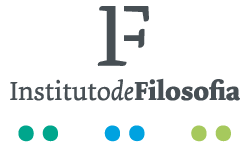Reference: TL-502-1386
Principal Investigator: José Meirinhos
The TL approaches medieval philosophy within a double perspective: from its history and from philosophy, without dissociating them.
We consider that:
- Medieval and Early Modern philosophy must be studied by itself. To do the history of medieval philosophy is to examine and to understand the problems, arguments and concepts that constitute philosophy, without need of further justification. The study of the reception of classical authors, understanding the novelty of philosophers or schools of thought, the emergence of problems, identifying the impasses and opposition of arguments, are approaches of historical nature evincing what is peculiar to philosophy and allowing to place the authors within relations of continuity and rupture;
- Medieval and Early Modern philosophy gives a solid contribution to philosophical discussion itself. For that reason, medieval philosophy should also be approached in a philosophical perspective. It is plausible and imperative to establish connections between the positions held by medieval authors and contemporary philosophical debates. Not only can the latter be illuminated and find a new expression through that contrast, but our understanding of the former is continually renewed if we read it from the problems and positioning of contemporary philosophy;
- In the Medieval and Early Modern period, though the delimitation of disciplines has been intensely discussed, the separation between philosophy, natural science and theology is rather thin. Approaching medieval philosophy, one must bear in mind this dialectic between disciplines, and that it should be aproached via cross-disciplinary research.
On the other hand, the dissemination of logic as an instrument for arguing in every disciplinary domain, and philosophy's prestige in the search for truth, invite us to look to medieval philosophy in order to find those features distinctive of philosophical thought, and the answer to the problem, itself a philosophical one, of the ends of philosophy; - A training in Medieval and Early Modern philosophy that sheds light on problematic conceptual connections characteristic of this philosophical domain provides crucial instruments of thought and an acquaintance with sophisticated solutions which are particularly useful to the study of any other period in the history of philosophy, as well as any other disciplinary domain within philosophy.
It is from these foundational positions that the TL organizes research and all its associated activities.
The projects developed by the TL in recent years have lead us to widen the chronological limits of the studied period.
Despite its ideological origins, the concept of "medieval" is nonetheless a useful guide for the division of work in the history of philosophy. However, the research made on the Aristotelian tradition, teaching institutions and the diffusion of philosophy (e.g. on the university and syllabi based on the Aristotelian corpus), within the peninsular context has ultimately led to questioning the boundaries of the studied period. It is consensual today that there isn't a single breaching point that signals the end of the Middle Ages, but rather that in the long span between the 13th and the 16th or 18th centuries, an interesting phenomenon of continuity and irruption of novelty within philosophy. It is for that reason that the group adopts as its subject the Middle Ages and the beginning of the Modern Age, encompassing what is also called "scholastic" and "second scholastic". This peculiarity is also present in the domains of literature and historiography, both of which fall under the scope of project SMELPS.
TEXTS, INSTITUTIONS, LITERARY GENRES, PROBLEMS
Though research is done on Greek or Arabic medieval authors, most of it is centered on the Latin tradition. The very nature of the medieval texts imposes a complex and specific profile on this domain of research and drives the organization of research groups and their activities.
In the 2015-2020 period questions pertaining to logic, metaphysics, epistemology, politics, of the symbolic and literary expression of power, archetypes of culture and thought. Philosophical competences are indispensable to this research. In the next quinquennium the articulation of Medieval Philosophy with Modern and contemporary Philosophy will be explored and, for that reason, cooperation with the groups in the IP devoted to other periods in the History of Philosophy;
A wide range of texts and medieval literary traditions will be taken in into account, especially from the domains of liberal arts, philosophy, theology, literature, poetry. For that reason, the composition of the team is multidisciplinary and, besides philosophers, it includes researchers with training in theology, history, latin and romance philology, literature.
Good part of the texts of medieval philosophy are still unpublished and some of those are of interest to the projects of TL, which makes it necessary to have them in manuscript, and in the most fortunate cases to prepare the respective editions. The nature of the sources demands philological and critical competences which are included in the competences of the LT members, or whose acquisition requires the organization of specific advanced training.
Medieval philosophical literature is diversified in literary genres whose reading depends on the understanding of the respective structures and functions.
GENERAL RESEARCH GUIDELINES
1) To be insightful, research in Medieval and Early Modern philosophy can't renounce the specialization and analytical detail that correspond to its own subject matter, so we take as fact that erudition is indispensable in this domain of philosophical studies.
2) We share the conviction that scientific work on such a vast and rich chronological span demands a multiplicity of approaches, as those which we combine in both research groups of the Thematic Line:
-
RG-502-1599 Aristotelica Portugalensia. The Reception of Aristotle in Portugal until the 18th Century
-
RG-502-1908 Reason, Politics and Society in Medieval and Early Modern Philosophy
